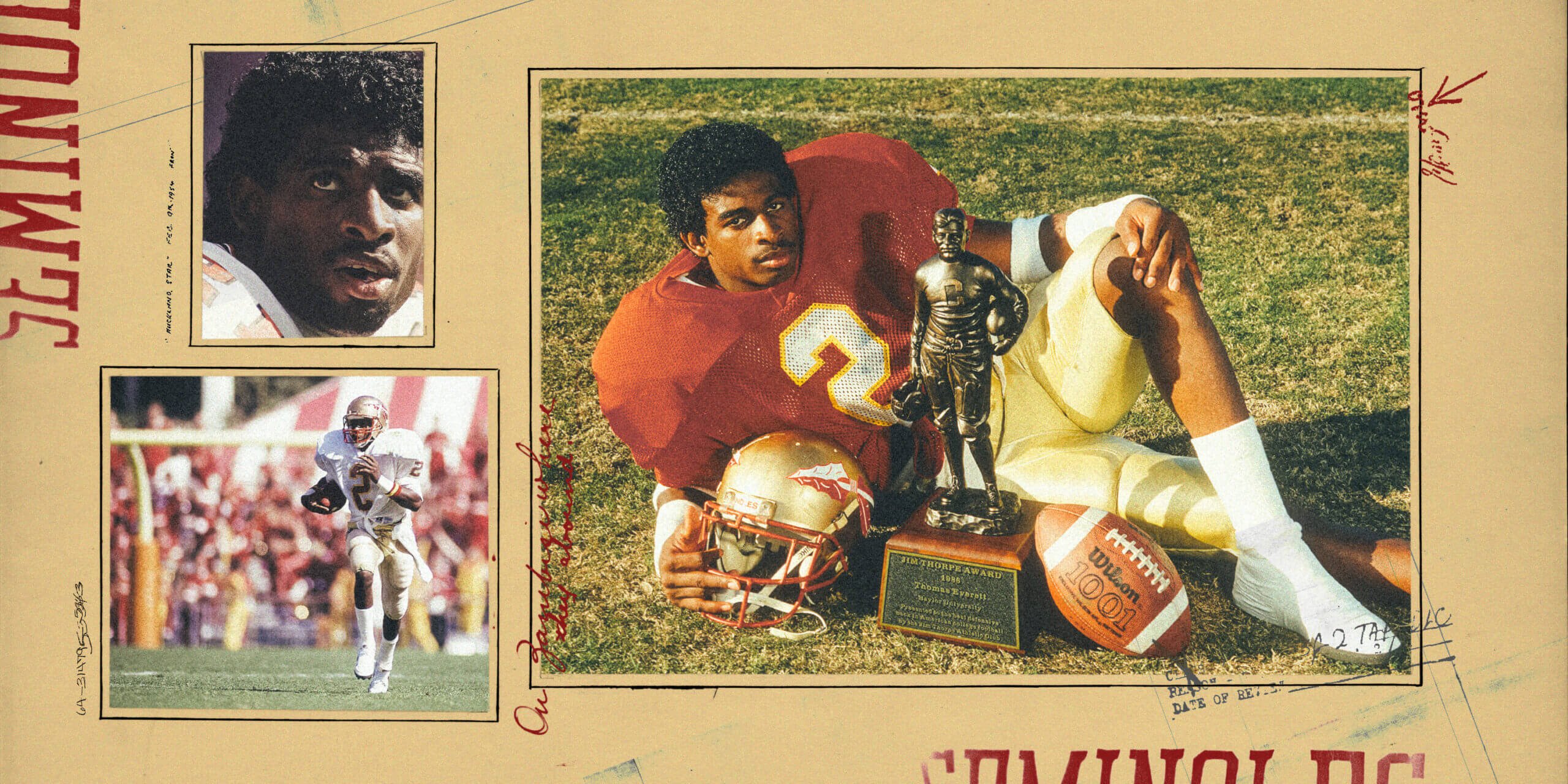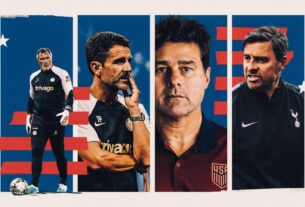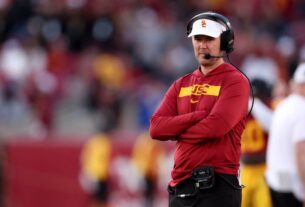In the 1980s, Bobby Bowden kept his Florida State football team in a hotel in Thomasville, Ga., the night before games to escape the distractions of Tallahassee. On game day, the Seminoles would bus about 45 minutes south to Burt Reynolds Hall, a dorm on Stadium Avenue, to drop off their clothes and walk to the locker room.
But in 1988, as Deion Sanders’ fame was reaching a frenzy and “Prime Time” was becoming “Prime Time,” there was a limo waiting in front of the dorm. At first, there was confusion. Then Sanders flashed a smile.
He had arranged a private ride to ensure he arrived in style for the late-November game against Florida.
“Oh, he was going to make that entrance,” said Brad Johnson, a quarterback on that Seminoles team who played 17 seasons in the NFL.
“I mean, who would even think of stuff like that?” said then-FSU safety LeRoy Butler, later a four-time first-team All-Pro for the Green Bay Packers.
Before he became the only player to appear in both a World Series game and Super Bowl, and long before he was Coach Prime, the energetic, everything-is-personal leader at Colorado, he was a young quarterback who had to learn a new position. He was a multisport star who picked up track and field for one full year, qualified for the Olympic time trials, then never participated in the sport again. He was a cornerback so dominant that he’d occasionally get bored by the inaction and let receivers appear to be open to get the ball thrown his way. He was a teenager who threw down 360 dunks on frat bros during intramurals, then left the pickup games to star as an outfielder on the baseball team. He was — despite the on-field persona, the high-stepping and the showboating — quiet in practice and focused on his craft. He cared about his brand at a time few others did, signing his autograph with a dollar sign for the “S” in his last name.
“We didn’t have money,” Butler said, “but in his mind, he was rich.”
These are the hard-to-believe but sworn-to-be-true stories from Sanders’ time at Florida State.
Mickey Andrews wasn’t responsible for recruiting southwest Florida while working as Florida State’s defensive coordinator for 26 years. But during his first year there, in 1984, an offensive assistant coach wanted to show Andrews a potential recruit.
The athlete was a left-handed quarterback in a wishbone offense at North Fort Myers High School. It was unclear how he would project in college football, and there was little film on him.
After the football season, Andrews visited the school. It was basketball season, so he watched the kid hoop. “You can’t really hide skill on a basketball court,” Andrews said.
Sanders must have impressed on the hardcourt. Florida State offered him a football scholarship a few days later.
But when Sanders arrived, the FSU coaches were split on where he’d play. The offensive staff fought for Sanders to play wide receiver. Defensive coaches wanted him at cornerback.
“It was spirited,” Mark Richt, then a graduate assistant, said with a laugh. “In the end, after a good discussion, coach Bowden just said if we’re ever going to win a championship here, we need to win with defense. So coach Bowden was the final vote of why Deion started on defense.”
Memories of the events nearly 40 years ago are a bit hazy, but those involved said Sanders had played little to no cornerback before arriving on campus.
During those first few practices, his athleticism was obvious — even if his form was ugly.
“He had an awful lot to learn (about) playing that position,” Andrews said. “At that time, tackling was not a priority for him.”
In 1985, in Sanders’ fifth collegiate game, Florida State played Auburn, led by star running back Bo Jackson. On one play, Jackson broke free to the outside and had only Sanders to beat. Sanders went to make the tackle and was quickly stiff-armed into the grass.
“Deion was about 175 pounds at the time, probably had never worked with weights,” Andrews said.

GO DEEPER
Is the Deion Sanders way working at Colorado? It depends which way you look at it
But Sanders got better as the season progressed. Florida State started two sophomore cornerbacks ahead of Sanders, players from whom he was eager to learn.
“I think he wanted to pick their brains and learn that position,” said running back Sammie Smith. “But in all reality, there wasn’t too much they could teach once he got over there because he was such a gifted athlete.”
A month later, the starting lineup was shuffled, and Sanders became the team’s top corner.
“He was better than me after about a week,” said Martin Mayhew, one of those sophomore cornerbacks, a nine-year NFL veteran and the Washington Commanders’ general manager from 2021 to 2023.
Mayhew was a punt returner in high school. He thought he’d get that job in college, too. But Sanders quickly leapfrogged him on the depth chart.
“I’m like, ‘This dude just got here, and they’re already putting him in front of me? And I’m not even getting a shot?’” Mayhew said.
So Mayhew protested the coach’s decision. He skipped the punt return portion of the following practice, sure the coaching staff would realize that a freshman couldn’t handle the job.
“Nobody even noticed that I wasn’t there,” Mayhew laughed. “No punishment, nothing. I never had to go back out there again, because he was the dude and I wasn’t.”
As Sanders learned to play cornerback, he made life hell for the offense in practice. Quarterbacks complained to coaches that one-on-one passing drills were useless when Sanders lined up at corner.
“It wasn’t even productive for the offense,” said Chip Ferguson, then a quarterback at FSU. “We had to run a trick play against him every time because you couldn’t run a normal play.”
But Sanders didn’t show up the offense after making interceptions at practice. During those sessions, they said, he was quiet, much different from the trash-talking showman he was on Saturdays.
“Because he was working,” Johnson said. “But on game day, it was different.”
In 1988, Florida State traveled to Michigan State for an early season showdown between arguably the country’s best wide receiver and cornerback. Andre Rison was a senior who was breaking every Spartans school record.
Typically, Florida State didn’t match up Sanders against a specific wide receiver. But for this game, they made an exception.
Before the first play, Sanders was waiting for Rison in front of the Michigan State sideline. He let the opposition know that Rison wouldn’t be an option on this day.
“I don’t know if there’s a word above ‘arrogance’ for when you’re on the field wearing No. 2 with a long towel hanging down and wearing long white socks while looking at the sideline and telling them, ‘You can’t throw it to your No. 1 receiver today,’” Butler said. “We used to watch that and marvel at it.”
Rison finished the game with one catch. The Seminoles won 30-7.
“That’s when I was like, ‘This dude is something else,’” Mayhew said.
But Sanders didn’t celebrate. He was upset he didn’t have any interceptions. “He was like, ‘Coach, they won’t throw the ball my way,’” Andrews said.
Sanders also had begun to bait receivers by letting them beat him off the line of scrimmage.
In a game against Miami, Sanders let Michael Irvin get by him. “Because he knew he was faster than Michael Irvin,” Mayhew said. “Then he ran him down, jumped over him and intercepted the pass.”
In September 1988, Florida State went to Clemson for a top-10 matchup. The Noles trailed in the fourth quarter but forced a Tigers punt. Sanders told teammates on the sideline that he was about to return the kick for a touchdown.
“Kind of like Babe Ruth calling his home run,” Andrews said.
When Sanders lined up deep, he egged on the home fans and the opposing coaches. By this point in his senior year, it didn’t make sense to throw Sanders’ way or punt at him. But teammates thought Sanders’ antics made opposing coaches want to test him. After watching him dance and showboat and call for the ball, they wanted to beat Florida State by going right at Sanders.
“He would (tick off) coaches and they’d go after him,” Butler said.
So Clemson, as Smith put it, “was crazy enough to punt to him.”
Sanders took the ball back 76 yards for the game-winning score.
By that point, he was the most popular man in Tallahassee. Teammates wanted to take advantage of his celebrity, sure his presence would help them cut lines at bars and get some free drinks.
They’d promise bouncers at The Moon nightclub that Sanders was on his way, their ticket into the nightclub even if Sanders never showed up.
“We used to beg him to go to parties because he doesn’t drink but we needed him to get in,” Butler said. “He had a goal, and he didn’t want anything to mess his brand up.”
Sanders played intramural basketball with a group of football players, a way to stay in shape in the offseason and settle locker-room debates about who the best player was among them. Sanders typically got to the gym a few minutes before the game. The rest of the team was warming up. The 6-foot-1 Sanders grabbed a basketball, ran toward the hoop and casually did a 360-degree dunk. After that, he said, he was ready to play.
“We used to play these frat boys, and they did not like that,” Butler said. “He had a cold jumper, too. The guy could’ve played in the NBA.”
At the start of one spring intramural game, Sanders told the team he needed them to play fast. He had a baseball game to play afterward.
“I was like, wait, wait, wait, wait,” Butler said. “You’re our best player in intramurals and you’re gonna get tired — and then go play baseball? He said, ‘Yeah.’”
Butler looked at the rest of the team, including All-American wide receiver Lawrence Dawsey, in disbelief.
“This man is not human,” Butler said. “Everybody gets tired. But some people were born with that gift. I think he’s arguably the best athlete ever known to man.”
His legend grew in the spring of his junior year. He was with the baseball team in Columbia, S.C., when he learned the track team lost one of its members of the 4×100 meter relay to an injury. Their meet that weekend was also at South Carolina.
So Sanders volunteered to join the relay in between a doubleheader with the baseball team. Track coach Dick Roberts agreed to have Sanders come aboard before learning Sanders had never actually run track. He didn’t know how to pass the baton in a relay.
So Roberts wanted Sanders to run the final leg, which was usually run by Smith, the football team’s running back. But Sanders refused. “That’s Smith’s spot,” he said. “He’s earned it.” Sanders would have to learn how to pass the baton.
“The anchor leg of relays is like the electric leg, the leg that gets all the hype, and the one people come to see,” Smith said. “So for him to turn that down, turn down the limelight and stay in the shadows, just showed tremendous humility and character and thinking about others more than himself.”
After the first baseball game, Sanders and the baseball team made their way to the track.
“He’s walking up to the meet and taking off his jersey while he’s walking,” Mayhew said. “He comes up to the track, and 10 minutes later he was running — and we ended up winning.”
Sanders’ new teammates convinced him to stick with track the following year, too. They said it’d be good prep for the NFL Scouting Combine if nothing else.
At that point, the 4×100 relay became a show in itself. Smith may have been the only person on campus faster than Sanders. And now they were running the third and fourth legs back to back. The group also featured Dexter Carter, a future NFL first-round pick, and Arthur Blake, who became a two-time Olympic hurdler.
So Johnson wanted to support his teammates. He played golf one Saturday morning, then was planning to head over to the afternoon track meet. But his round took longer than expected, and Johnson was running late. He pulled into the stadium, nervous he may have missed the event, only to see Sanders in the parking lot in slippers and a bathrobe.
Johnson was confused. Shouldn’t he be stretching?
“He looked back at me,” Johnson said, “and goes, ‘You ever seen a cheetah stretch before it runs?’”
When Sanders showed up for his lone full season in track and field, he didn’t know how to get into the blocks for the start of sprints. By the end of the season, he had posted a sub-10.3-second 100-meter dash, which qualified him for the Olympic time trials.
“Can you imagine if he had done track the whole time and trained?” Smith said. “I mean, he was so tight and was not flexible at all. He could barely touch his toes standing up. But could you imagine if he had worked on that and had track and field in his background for years? There’s no telling how fast that cat would’ve run.”
Word of his speed traveled quickly, and scouts gathered for Florida State’s pro day that spring. His 40-yard dash was going to be a spectacle.
Sanders brought his track cleats with him out of habit. He ran it in 4.30 seconds. But the scouts stopped him. The time isn’t going to count, they said. It’s not fair to run in track shoes. They told him to put on his football cleats.
But Sanders didn’t bring them. So he grabbed the high-top sneakers he arrived in and ran the 40 again. His time: 4.28 seconds.
“Then he looked at the scouts and goes, ‘Y’all come back tomorrow and I’ll do it again,’” Johnson said.

GO DEEPER
NFL 100: At No. 28, Deion Sanders backed up the ‘Prime Time’ style with substance
The rest of Sanders’ career is well-chronicled. The six NFL All-Pro nods, the Defensive Player of the Year award, two Super Bowl wins. His nine seasons in the major leagues, his World Series appearance, his 186 stolen bases, his 154 extra-base hits, his helicopter ride from an NFL game to a late-season baseball game with pennant implications. The time coaching Jackson State, bringing attention to HBCUs, recruiting Travis Hunter, and dominating headlines at Colorado.

GO DEEPER
Deion Sanders mania was at its peak — then came losses. How did he respond?
All of it wild.
But to those who were at Florida State in the late ‘80s, he’ll always be the kid who was quiet in practices but extravagant in games, who befriended walk-ons and equipment managers, who gave them confidence and left them marveling at what he did on the field.
“There’s only one Deion,” Smith said. “I don’t know that there will be another Prime Time.”
(Top image: Eamonn Dalton / The Athletic; photos: Focus on Sport / Getty Images, John Biever / Sports Illustrated via Getty Images, Peter Read Miller / Sports Illustrated via Getty Images)







